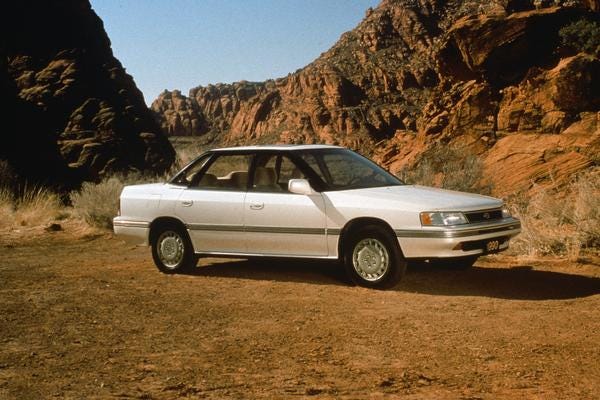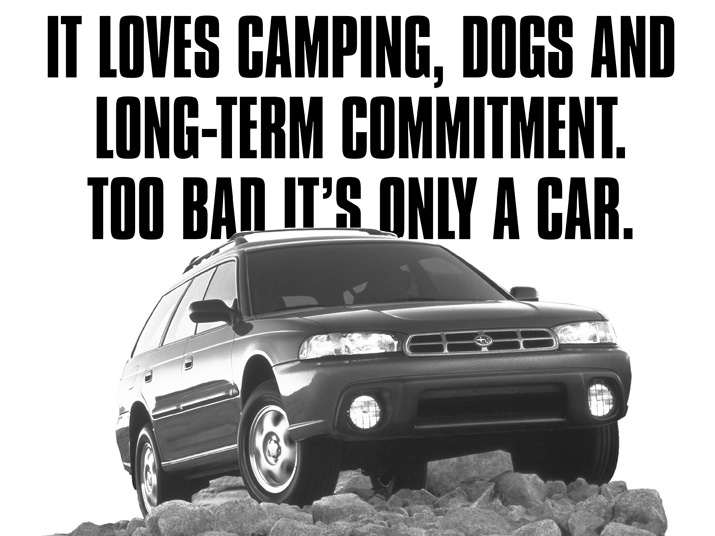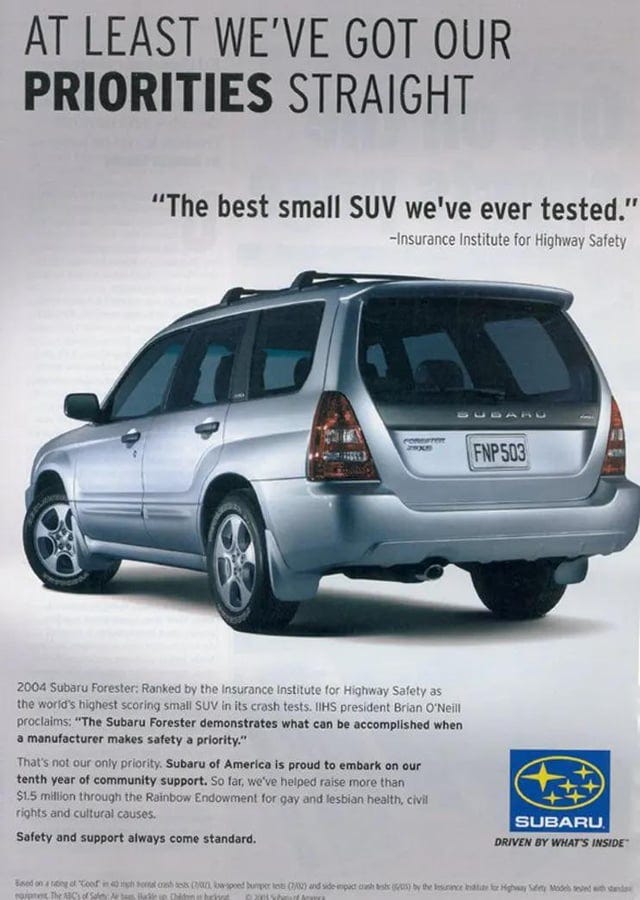Why do lesbians love Subarus?
The daring ad campaign which changed Subaru forever
So there’s a pretty common stereotype that you might of heard: it’s that lesbians love Subarus.
I was aware of the trope but didn’t given it much thought until a video popped up on my TikTok feed the other day. In it a woman talks to the camera while walking out of her house.
“If you ever wonder if there’s a lesbian nearby,” she deadpans. “Then just look for some Subarus, okay?”
She then flips around the camera to show no fewer than three Outbacks parked in front of her house.
This little video piqued my interest. What is the link between Subarus and gay women? After a little research I found an unexpected answer.
I wish I could take credit for this discovery but it’s been very neatly laid out in this article by Price Economics and again in this episode of the podcast Planet Economics.
But you’re here now so I’ll tell you the story.
It all starts in the early 1990s when Subaru were in a bit of trouble. They were in a sales slump and were battling with a public perception problem.
You see, Subarus are a gumboot of a car. Yes, they’re practical and good for the outdoors. But they’re not really something you want your friends to see you in.
So to fix their unfashionable reputation Subaru decided to go big.
In 1991 they hired Wieden & Kennedy – the agency behind Nike’s Just Do It campaign.
Of course a company riding off a success like that didn’t come cheap. The bill for Wieden & Kennedy came to a staggering $70 million dollars.
They presented a daring campaign which lambasted traditional car ads. This counter-culture approach came along with the slogan “Subaru: what to drive”.
As the New York times said at the time “Implicit in this quirky approach was, of course, what not to drive, like status-symbol cars.”
Subaru loved the idea. What resulted was a series of extraordinarily smarmy ads.
At one point in the above ad the narrator says that if a car "improves your standing with the neighbours, then you live among snobs with distorted values."
I get the intended message. Really I do. But who doesn’t want to own something other people covet? That’s part of the fun.
Perhaps unsurprisingly these ads did not resonate with car buyers.
With no improvement to sales Wieden & Kennedy got the sack after just two years.
“We need to refocus our efforts toward our traditional strengths as a niche marketer," Subaru’s CEO at the time George Muller said.
But who was in their niche?
Focus groups provided the answer.
There were teachers and educators; healthcare professionals; IT professionals; and “rugged individualists” (which is another way to say outdoorsy types).
But it was a gay man working as a researcher during this time who believed there could be another group they were missing.
“All my friends who drive Subarus are lesbians,” he said to the Subaru marketing head.
An interesting thought. But what to do with that information?
These days companies are more than happy to make a bid for the rainbow dollar, but it was largely unheard of in the early 90s. This was a time where the AIDs epidemic was rampant and there were plenty of laws which directly discriminated against the queer community.
Further to that, many businesses thought that if you marketed a product towards gay people, it would alienate your much larger hetrosexual audience.
But the marketing head of Subaru couldn’t shake the hunch that this was worth looking into. He just didn’t know how to go about it.
Luckily there was one tiny company who did: Mulryan Nash. They were an agency owned by two gay men specialising in ads for the queer community.
First, they set about seeing if the lesbians-drive-Subarus hunch was true.
Research showed that a lot of Subarus were being bought in Northampton Massachusetts. So they flew to the town, gathered a bunch of Subaru owners together in a room, and asked why they’d purchased their car.
All of the owners there were women. They were also Subaru fanatics who said they liked being able to transport their dogs and go camping with ease.
And yes. They were also gay.
Mulryan Nash worked on a campaign to target these woman and, surprisingly, Subaru gave it the green light.
What followed was a series of ads which had sly winks to the lesbian community.
For example, a straight observer might overlook the number plate on the first car which reads “XENA LVR”. But it was a subtle nod to Lucie Lawless who had become a gay icon with the show Xena: Warrior Princess.
While these ads were covert, they spoke directly to an audience who had largely been ignored by the media. It also put them at the centre of an in-joke without making them the butt of it.
And It worked.
Subaru continued to market to its niche audience and their car sales crept up.
In the 2000s they took it up a notch. Subaru hired Martina Navratilova, an openly gay tennis player, to be an ambassador. Their print ads also became far less subtle. Yes, the hate mail came, but Subaru stayed the course.
Subaru were one of the few car manufacturer to avoid the recession that affected much of the western world in the late 2000s. In the 2010s they had some of the best sales growth of any car maker in America.
The market is a bit tougher now.
Subaru is still Australia’s 8th largest manufacturer (their best market share in the world) but they’re losing ground to the likes of Kia and Hyundai. In America their sales have also been weaker in last five-or-so years.
Sadly, Subaru have also started making the same boring ads we’ve all come to expect from the automotive industry.
These days you won’t see queer representation whether it be overt or covert. Their ads all seem to consist of bland families with vacant smiles driving on lightly rugged roads.
So I suppose you can look at this story one of two ways.
The cynic will say that Subaru were only willing to speak to lesbians so long as it was financially prudent to do so. The optimist will that Subaru made a brave decision to champion gay women when no one else would. Therefore they should be owed a certain level of kudos.
Either way, lesbians continue to support the Subaru brand online with genuine passion and humour.
A sound audience investment if ever there was one.
Thanks for making it to the end. I hope you have a lovely Monday and I’ll see you next week.
Steph







